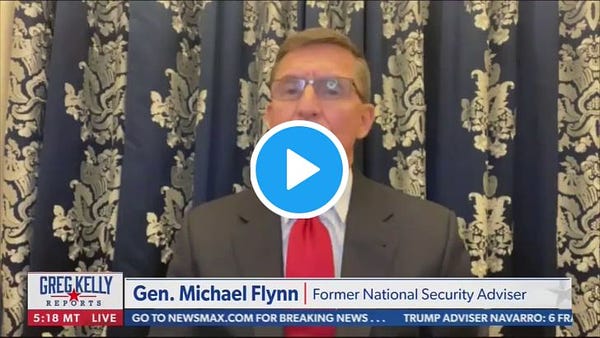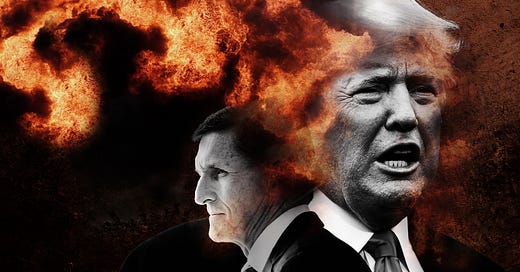Let’s stipulate that any talk about coups is crazy. Our traditions and institutions — both in and out of the military — are simply too strong, and the very idea of a coup is so profoundly un-American that it is unthinkable.
And yet, we spent the Memorial Day weekend thinking about it, because a three-star general who was also the National Security Advisor to the President of the United States seemed to suggest that a military coup might be good idea here.
A questioner asked the retired general: “I’m a simple marine. Why can’t what happened in Minimar[sic] happen here?” He is clearly referring to a military coup and the audience clearly understands him — and cheers.
“No reason,” says Flynn. “It should happen here.”
Nicholas Kristof reminds us that the Myanmar coup involves “overturning elections, shooting protesters, torturing students, destroying the economy -- and it's fresh off a genocide of the Rohingya.” As many as 800 people have been killed in the junta’s crackdown.
Flynn is now furiously backtracking, denying that he was endorsing a coup, but you can watch the tape here.


This is not the first time that Flynn has appeared to dance on the ragged edge of insurrection. Late in December, Flynn told Newsmax that Trump could “take military capabilities, and he could place them in those [swing states], and basically re-run an election in each of those states.”
“These people out there talking about martial law like it’s something that we’ve never done. Martial law has been instituted 64 — 64 — times,” Flynn said.


Flynn met with Trump at the White House, and during one meeting, Trump asked about the idea of using the military to keep him in power.
**
So should any of this merit more than a eye-roll now? Maybe.
Michael Gerson warns that “American politics is being conducted under the threat of violence.”
This is not a joke. This is not a myth. This is not a drill. According to a survey last year, a majority of Republicans agreed with the statement: “The traditional American way of life is disappearing so fast that we may have to use force to save it.”
This includes at least arm-chair contemplation of the idea of military coups. Just last month, the uber-Trumpy site, American Greatness, published a piece by retired U.S. Army Colonel Douglas A. Macgregor openly speculating about the prospect.
“Is a military coup really feasible in democratic France?” Macgregor asks. “If France wants to remain a sovereign nation, the answer may be yes. What does that mean for America?”
Macgregor is clearly a coup fetishist.
He calls the French army “the last, true repository of national identity and French value.”
Ideology notwithstanding, the destiny of a great nation frequently rests on the shoulders of the few who lead it. In France, it seems that destiny now lies in the hands of its national military leadership.
Then he makes the pivot to the idea of a coup here, imagining how the “guardians of national and order and security” in the United States would react to urban disorders. Here’s what he wrote:
What Americans should be asking themselves as we watch the unfolding disaster from across the Atlantic is when (in all likelihood), not if, we will face the same predicament.
It’s painfully obvious that many, if not most, of the senior military leaders like Chairman of the Joint Chiefs General Mark Milley are committed to globalism and multiculturalism, but one wonders what the majority of patriotic American soldiers, sailors, airman, and Marines, along with the courageous police officers and firefighters across the country, really think. What will these guardians of national order and security do when they confront more chaos and disorder on the scale of last summer’s criminal violence against American symbols, citizens and property in the months and years ahead?
Lest you quickly dismiss Macgregor as merely another crackpot itching for a putsch, it’s worth remembering Trump had appointed him as the U.S. Ambassador to Germany.
And, as Axios reported in detail, last November Trump also personally tapped Macgregor to be senior adviser to the acting secretary of defense, in charge of overseeing the withdrawal of American troops from Afghanistan, Iraq, Syria and other places around the globe.
He had met Trump for the first time at an hour-long Oval Office meeting in April 2020. The two men bonded instantly. When the meeting ended, Trump told Macgregor, "I want you working for me. We will find a way."
Trump had warmed to Macgregor through his frequent appearances on Fox News, where the colonel blasted the U.S. military's presence overseas, called congressional leaders "idiots," and ridiculed Pentagon policies on diversity and transgender troops.
[General Mark Milley, the chairman of the Joint Chiefs of Staff] considered Macgregor "irrational edging on all-out lunacy."
It didn't take long for Macgregor to agree to McEntee's offer to come onboard. ..
**
But it is not just Macgregor and Flynn who toy with the idea of martial law and coups. In the run-up to the January 6 attack on the Capitol, Trump surrounded himself with MAGA leaders who openly called for him to invoke the Insurrection Act and deploy troops to overturn the election.
Specifically, Trump considered ordering the military or the Department of Homeland Security to seize voting machines from some swing states.
Meanwhile, the White House devolved into a swamp of seditious crazy. Trump met with attorney Sidney Powell, and reportedly considered appointing Powell as a special counsel to investigate election fraud. At one point she tweeted:
Dear Mr. President, We will not stand by and watch Foreign and Domestic enemies further destroy our Constitutional Republic. Eighty and more million of us request that you use the Insurrection Act, Suspend the December Electoral College Vote, and set up Military Tribunals immediately, to properly investigate and resolve the cyber warfare 11-3-20 issue. Further, we request you suspend the Jan 6 GA Runoff Race, and the January Inauguration until this issue is resolved. Respectfully, We The People.”
Trump ally Roger Stone also pushed the idea of invoking the Insurrection Act.
“The president's authority is the Insurrection Act and his ability to declare martial law,” he told host and conspiracy theorist Alex Jones. Stone added that Trump could also use the law to arrest anyone from Facebook CEO Mark Zuckerberg for election interference, to Democratic power couple Bill and Hillary Clinton…
**
None of this was remotely possible. But here is where the story moves from troubling to alarming.
Even Administration officials were rattled, with one telling Axios that when Trump is "retweeting threats of putting politicians in jail, and spends his time talking to conspiracy nuts who openly say declaring martial law is no big deal, it’s impossible not to start getting anxious about how this ends."
Military officials took the notion of martial law and coups seriously enough that they felt they had to say something.
In early January — days before the attack on the Capitol — all 10 living former defense secretaries signed an open letter warning that “Involving the military in election disputes would cross into dangerous territory.”
As senior Defense Department leaders have noted, “there’s no role for the U.S. military in determining the outcome of a U.S. election.” Efforts to involve the U.S. armed forces in resolving election disputes would take us into dangerous, unlawful and unconstitutional territory. Civilian and military officials who direct or carry out such measures would be accountable, including potentially facing criminal penalties, for the grave consequences of their actions on our republic.
This is worth emphasizing. They. Felt. The. Need. To. Say. This.
**
As we know now, support for insurrection spread among the president’s supporters with deadly consequences. According to new indictments, groups like the Oath Keepers began agitating for a forceful and violent response shortly after Trump’s defeat. Six days after the election, a leader of the group declared:
“We’re going to defend the president, the duly elected president, and we call on him to do what needs to be done to save our country. Because if you don’t, guys, you’re going to be in a bloody, bloody civil war and a bloody — you can call it an insurrection or you can call it a war or fight.”
“I’m willing to sacrifice myself for that,” [Stewart] Rhodes allegedly also told followers. “Let the fight start there. That will give President Trump what he needs, frankly. . . . We want him to declare an insurrection, and to call us up as the militia.”
**
The Senate GOP has killed the prospect of an independent, bipartisan January 6 Commission, and they clearly hope that it will fade into the mists our of short attention spans.
But support for insurrection has not evaporated. If anything, activists have been emboldened.
Are some of them in the military? Retired Brigadier General Thomas Kolditz is worried.
But Trump’s supporters in the military who think that what happened [on Jan. 6] was a good thing need to be managed out of the military as soon as possible. And it’s a duty obligation of the defense leadership to make sure that there are no, essentially, sleeper cells, people in the military who, for whatever reason, think an insurgency is a good idea or justifiable.
Meanwhile…


The “walking filibuster” in Texas put pressure on DC Dems. Via the Wapo:
Texas Democrats who defeated a Republican effort to pass a suite of new voting restrictions with a dramatic late-night walkout from the state House chamber on Sunday have a message for President Biden and his allies in Congress: If we can protect voting rights, you can, too.
The surprise move by roughly 60 Democratic lawmakers headed off the expected passage of S.B. 7, a voting measure that would have been one of the most stringent in the nation, by denying Republicans a required quorum and forcing them to abruptly adjourn without taking a vote
Mollie’s tears.





Things fall apart. Portland is rapidly becoming a progressive dystopia.
After months of social-justice activism that made Portland a vivid, sometimes violent focal point for a nation debating the same issues around police accountability and reform, the movement here has splintered into bickering groups, at odds over tactics, goals and an overall direction for how to make the city safer, with the police force still at the debate’s bitter center….
The nightly confrontations with police and federal agents deployed here by President Donald Trump have been replaced by a kind of generational hopelessness, a tenuous sense of security across an under-policed city and a return to an old-school style of gun violence reminiscent of a tit-for-tat cycle of deadly reprisals, almost always among young men of color. Through April, the police reported 348 shootings, more than double those recorded over the first four months of last year.







